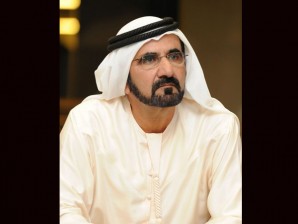UAE rejects Egypt call to free ‘Brotherhood’ detainees

UAE Vice President and Prime Minister Sheikh Mohammad bin Rashed al-Maktoum. Photo from the Sheikh’s official Twitter account.
DUBAI—The United Arab Emirates has rejected a request from Egypt for the release of 11 of its nationals detained for suspected links to Egypt’s ruling Muslim Brotherhood, the Gulf News paper reported on Saturday.
The case has sparked a sharp deterioration of relations between Abu Dhabi and Cairo, which had already been strained since the election of Brotherhood candidate Mohamed Morsi as Egyptian president last June.
But at a meeting in Dubai on Wednesday, UAE Vice President and Prime Minister Sheikh Mohammad bin Rashed al-Maktoum told top Morsi adviser Essam el-Haddad and intelligence chief Mohammed Shahata that releasing the 11 without trial “is not possible,” Gulf News reported.
“We have a strong court system and justice will take its course,” the paper said the Egyptian delegation was told.
In the Saudi capital Riyadh, visiting Egyptian Foreign Minister Mohammed Kamel Amr said on Saturday in reference to the case that Cairo does not interfere in the affairs of others.
Article continues after this advertisement“Egypt does not interfere in any way in the domestic affairs of other nations,” he said at a news conference after being asked about the case.
Article continues after this advertisement“What is happening in Egypt is an internal affair that concerns only the Egyptian people. We have no interest in exporting what is taking place in Egypt to another country.”
The 11 Egyptians arrested last month stand accused of leading an expatriate Brotherhood cell in the UAE that collected sensitive information and had links to Emirati nationals in custody on suspicion of plotting against national security.
But Brotherhood spokesman Mahmud Ghozlan told AFP in Cairo that the arrests were part of an “unjust campaign” against his compatriots, most of whom are doctors or engineers.
Any suggestion of regime change is extremely sensitive in the UAE and other Gulf states, which have been largely spared the upheaval of the Arab Spring that from early 2011 swept aside autocratic governments in the Middle East and North Africa.
During the past year, the United Arab Emirates announced it had broken up several cells it said were plotting against its security.
It continues to ban all political parties.